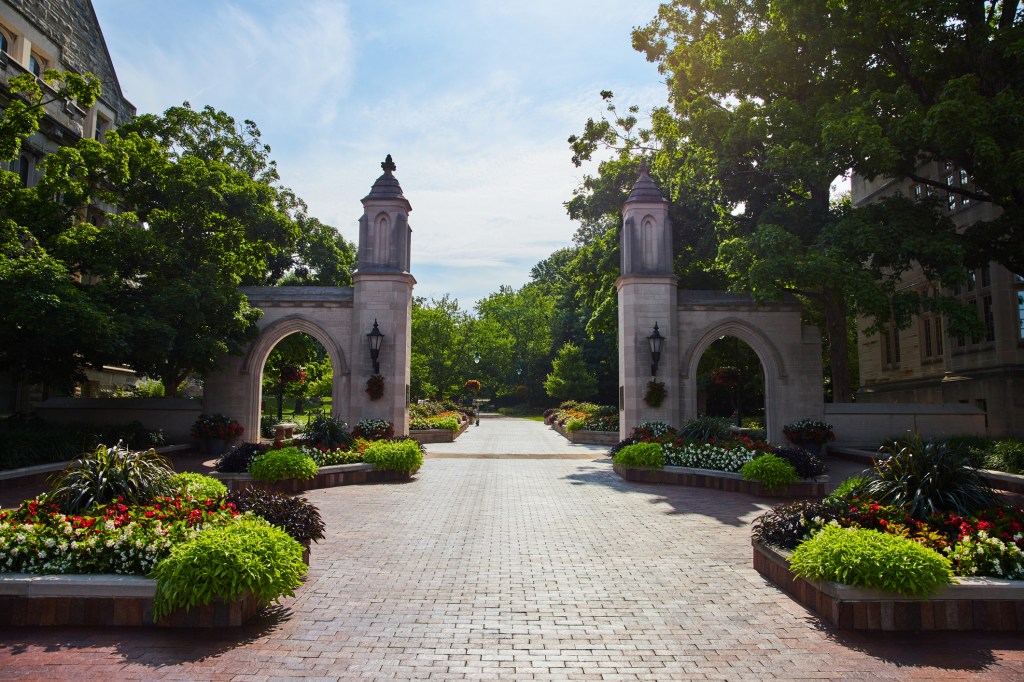Ever since the Trump administration issued an executive order barring federal agencies from holding diversity, equity, and inclusion workshops, Republican state legislatures have explored ways to rein in “divisive concepts” within their jurisdictions. Some legislatures have sought to ban state university professors from requiring that students “believe” such divisive concepts.
Perhaps the earliest and most aggressive innovator of such policies was Florida, which has used divisive-concepts legislation as a central prong in its far-reaching effort to “reform” state higher education. The state’s Stop WOKE Act—components of which were recently struck down in federal court—bans the promotion of divisive concepts in state university classrooms. The state has also restricted DEI administrative activities and overhauled the New College of Florida, a small state-run liberal arts college.
Indiana is the latest state to take a similar approach, hoping to incorporate “intellectual diversity” requirements to its colleges’ hiring protocols. But much like previous legislative attempts that try to tell universities what they should teach, Indiana’s proposed law is misguided.
Indiana Senate Bill 202 has passed the state legislature and now awaits the governor’s signature. The bill has several components, some more controversial than others. It directs boards of trustees to create “diversity committees” focused on “cultural and intellectual diversity issues” and to expand the mission of diversity offices to include intellectual diversity. It bans politicized diversity statements for admission and hiring, and directs universities to adopt a policy of institutional neutrality on matters of public controversy.
The heart of SB 202, its real innovation, would add an article to state code for “the protection of free inquiry, free expression, and intellectual diversity.” Essentially, the bill would bar faculty at state universities from receiving tenure if their past performance indicates that they are:
- “unlikely to foster a culture of free inquiry;”
- “unlikely to expose students to scholarly works from a variety of political or ideological frameworks that may exist within and or applicable to the faculty member’s academic discipline;” or
- likely “to subject students to political or ideological views and opinions that are unrelated to the faculty member’s academic discipline or assigned course of instruction”
The bill also directs a university’s board of trustees to conduct periodic post-tenure reviews that would allow professors to be fired for failing to foster a culture of free inquiry and intellectual diversity at the university. It also directs universities to establish an office to receive and investigate complaints about faculty conduct relating to intellectual diversity.
Supporters might point to two of the bill’s clauses to quell concerns about overreach. SB 202 includes a reservation clause asserting that nothing should be understood to infringe on academic freedom as well as a set of new protections for free expression that prohibit the board from considering a faculty member’s public commentary, criticism of university leadership, or outside political activity when making promotion decisions.
But those clauses notwithstanding, SB 202 marks a substantial departure from conventional tenure policies. Both private and public universities across the country often have a process for granting tenure to members of the faculty after a lengthy probationary period. Moreover, a substantial review process generally focuses on the quality of a faculty member’s teaching, research, and service to the department, university, and profession.
Indiana’s proposal, by contrast, would add a much more specific set of criteria to evaluating faculty performance. While universities are beginning to explicitly reward teaching, research, and service that advances the goals of diversity and inclusion, the Indiana proposal would add a similar component to tenure standards with a decidedly right-leaning twist. It’s not enough for the Indiana bill that teaching and scholarship be good in the eyes of a professor’s peers; it must also advance “intellectual diversity.”
These requirements, however, are not all that different from what we’ve come to expect from DEI contribution requirements. Both impinge on the freedom of teachers and scholars to structure their courses and research according to their professional judgment. Both keep academics from pursuing inquiry and advancing the truth without set end goals. Indeed, they redefine the mission of the university away from one of advancing knowledge.
Rather than being a realistic way to advance “intellectual diversity” on campus, the Indiana bill reflects a distrust of faculty that is now endemic on the political right. Whether partisan donors and business leaders who populate state boards can be expected to assess the intellectual diversity of course syllabi in a useful way seems doubtful. Likewise, the new post-tenure review standards insert board members more directly into the decision to retain or fire faculty. And establishing new bureaucratic offices to investigate student complaints about faculty would broaden an already unfortunate trend on university campuses.
Beyond potential problems of implementation, introducing an intellectual diversity component into faculty hiring and promotion decisions creates real conceptual challenges. Faculty are already expected to foster a culture of free inquiry and refrain from subjecting a captive audience of students to irrelevant political rants. Professors who disrupt the ability of others on campus to engage in their own intellectual pursuits or who abuse their role as an instructor can and should be disciplined under existing policies. If the Indiana legislature wants to empower university officials to terminate professors who seem insufficiently open-minded or welcoming of student digressions from the expected direction of the course, then these requirements are a rather indirect way to do so.
But must individual professors themselves promote “intellectual diversity”? Whether particular ideas should be encouraged within the scholarly enterprise is an important and highly contested question.
Serious universities should strive to engage with those who raise fundamental challenges to how free inquiry is done and whether it is even possible. A wide variety of postmodern views about free speech, for example, call into question the very meaning of “free inquiry” and “free expression.” The New Left social theorist Herbert Marcuse infamously advocated for a “repressive tolerance” and thought that “tolerance cannot be indiscriminate and equal with respect to the contents of expression … it cannot protect false words and wrong deeds which demonstrate that they contradict and counteract the possibilities of liberation.” Marcuse might be wrong, but the truth advances by engaging even with those who wrongly would seek to redefine the terms and conditions of “truth” and “tolerance.”
Would such scholars face a blanket ban from the university campus? Sure, perhaps a university bound by intellectual diversity requirements would be obliged to fire members of its faculty who subscribe to critical race theory and its views about the need to suppress certain ideas in the public sphere. By the same token, it might also be obliged to fire any members of the faculty who share the conviction of Christopher Rufo that there is a need to root out campus radicals and dispense with disciplines like women’s studies. Which views are seen as a threat to a culture of free inquiry and constitute the “false words” that must be suppressed for the sake of the common good will depend on the intellectual and political convictions of the regents.
Indiana’s bill would go further and require individual professors to incorporate intellectual diversity into their own teaching and expose students to a “variety of political and ideological frameworks.” What counts as an adequate “variety,” however, we are not told.
Variety is surely appropriate and useful sometimes. A survey of modern political theory that excluded liberalism or Marxism would hardly be worthy of the name. Could no course, however, be taught simply on “radical political thought” or “conservative political thought”? Can a course be offered on “liberalism,” or must it only be “liberalism and its critics”? If a law school class on “originalism” (never mind the critics) incorporated readings from liberal originalists, libertarian originalists, democratic originalists, and Burkean originalists, would that check the box for variety?
Worse yet, must professors give equal time to theories and approaches to their scholarly discipline that they think are wrong and a distraction? Must I be sure to include critical race theory in my constitutional law class? Must every macroeconomics class include a section on “modern monetary theory”? Must the economics department take seriously the “New History of Capitalism”?
There is no question that universities suffer from an “intellectual diversity” problem. Faculties tilt heavily to the political left, and perspectives and ideas that merit study and discussion are routinely excluded and dismissed. The pursuit of truth is hampered by universities that are politically captured or fail to be genuinely inclusive of all those who are willing to engage in the scholarly project.
Mandating that individual professors and individual classes themselves prioritize “diversity” and “variety” over truth is a step in the wrong direction. Universities should be internally diverse and pluralistic, but individual scholars need the freedom to pursue the truth as best they can and as they best understand it. They need the freedom to prioritize questions and perspectives that they think are most helpful to advancing human understanding, but also the humility and the open-mindedness to admit that they themselves might not have a perfect grasp on the truth.
Making universities a space where scholars and students interact with others who see things differently—including by creating various institutes and programs of “civic leadership,” to name a promising new proposal—is essential. But “intellectual diversity” initiatives like Indiana’s would, perhaps paradoxically, distort scholarly inquiry. They’d be a step away from preserving both the mission of the university and the academic freedom necessary to advance human knowledge.








Please note that we at The Dispatch hold ourselves, our work, and our commenters to a higher standard than other places on the internet. We welcome comments that foster genuine debate or discussion—including comments critical of us or our work—but responses that include ad hominem attacks on fellow Dispatch members or are intended to stoke fear and anger may be moderated.